Published on November 25, 2024 by Deepali Awasthi
Overview
The DTC model is revolutionising the e-commerce landscape by reshaping how businesses engage with customers and deliver products. This model involves brands selling their products directly to consumers without intermediaries such as retailers or wholesalers.
As consumers’ buying habits evolve and more people reconsider their shopping preferences, there has been significant growth in the DTC marketplace. From digitally-native brands to traditional manufacturers, many businesses are now exploring ways to leverage new DTC models and strategies.
The pandemic changed the face of retailing forever. Shuttered stores, disrupted supply chains, idle inventory and evolving health restrictions forced retailers and manufacturers to radically rethink their business models and revenue streams. It catalysed rapid digitisation and digital adoption. KPMG reported that consumers are ready to pay more for DTC services, helping to accelerate growth of DTC channels and creating unique opportunities for new DTC value propositions.
Shifting consumer preferences towards the DTC model
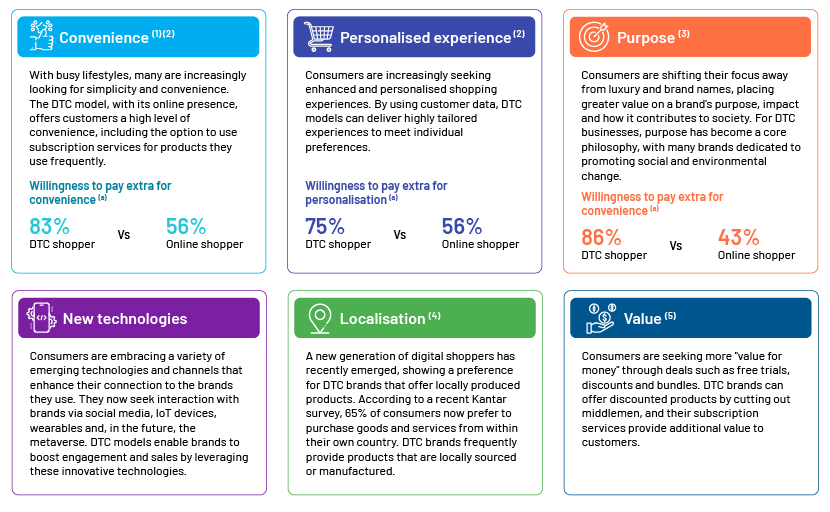
Notes: (a) The survey was conducted by IAB UK and research and strategy consultancy MTM for UK DTC consumers and UK typical online consumers
Sources: (1) Big commerce blog, 5 direct-to-consumer trends in 2020; (2) Forbes, Why Consumer Trust in Direct-To-Consumer Brands is On The Rise, September 2019; (3) IAB; New IAB UK report identifies 50 of the UK’s leading Direct-to-Consumer brands; (4) Brand Equity: Localism becomes a mainstream movement, May 2020; (5) Clarkton Consulting; Investing in Direct-to-Consumer during the Coronavirus Pandemic
Global DTC market size
The global DTC market is estimated to reach USD200bn in 2024, doubling in size from 2020. The market has seen significant growth and transformation, driven by changing consumer preferences, technological advancements and the increasing control of DTC companies over brand messaging and consumer engagement.
US DTC market
DTC e-commerce sales by established brands are projected to reach USD159.76bn in 2024, growing at a CAGR of 54.76% over 2020-24, driven by technological advancements, shifting consumer preferences and the acceleration of e-commerce during the pandemic.
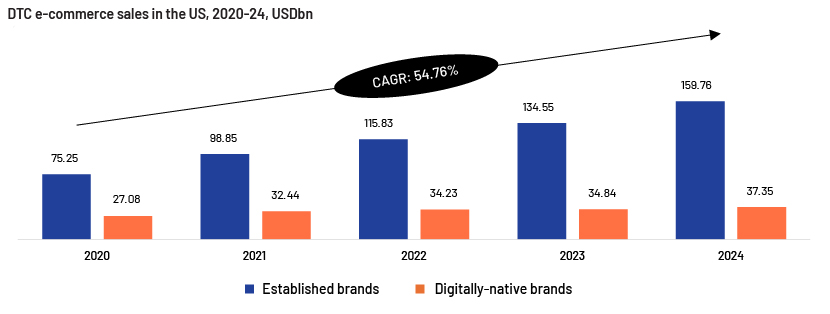
Additionally, certain markets exhibit more potential for DTC growth than others. In China, approximately 20% of online sales are DTC, whereas in North America, the figure is about 16%. In contrast, India's DTC market is much less developed, with only 2% of online sales through this channel. This low penetration, combined with high demand for online shopping, presents a significant opportunity for manufacturers to expand their DTC efforts.
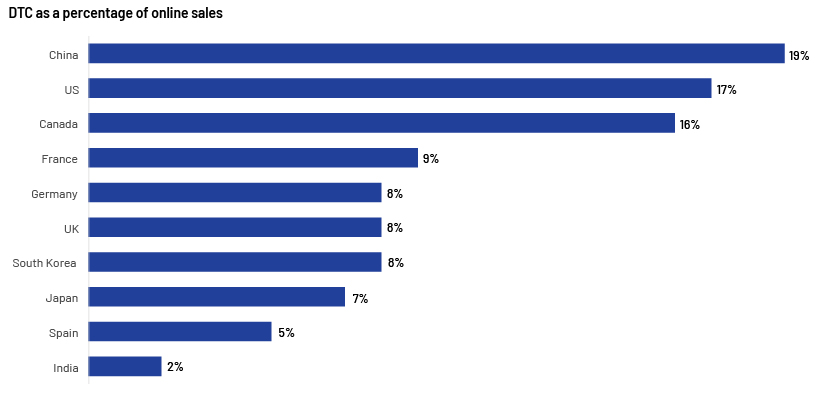
Retail e-commerce market
As customers and manufacturers become more interested in interacting, there has been a significant increase in DTC channels. In part, growth in DTC is linked to growth in the retail e-commerce experience. The retail e-commerce market is expected to reach USD7.4tn globally by 2025, growing at a CAGR of 12% from 2020 to 2025. The DTC sector in this area is experiencing higher growth rates due to the changes introduced by the pandemic, which accelerated the adoption of e-commerce.
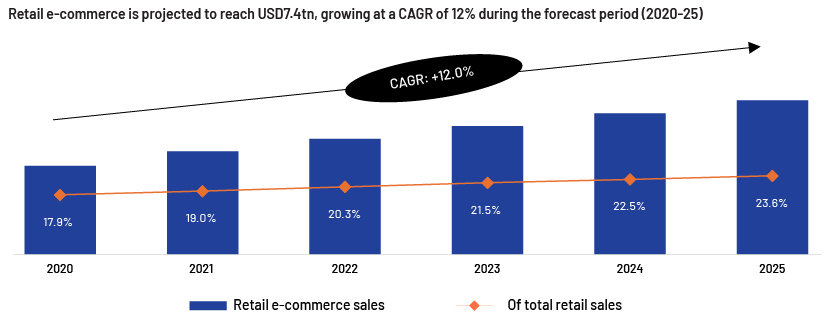
Brands are using strategies such as social media engagement, influencer partnerships and user-generated content to thrive in the digital marketing market. They are also exploring innovative marketing tactics such as pop-up experiences and referral programmes to improve customer engagement and increase sales.
DTC brands have replaced traditional retail intermediaries, giving them greater control over their marketing, sales and customer service strategies. This transformation has not only democratised the retail industry but also led to significant innovations in the way products are sold and consumed.
Market trends
Revolutionising customer relationships
Direct feedback loops: The direct feedback loop between brands and customers is a major advantage of the DTC model. DTC brands can quickly gather and respond to consumer feedback through social media interactions, customer reviews and direct communication channels. This enables rapid product improvements and innovations by leveraging real-time customer input.
Data-driven decision-making
Enhanced consumer insights: DTC brands can access rich consumer data directly, enabling them to make informed decisions about product development, marketing strategies and inventory management. This data-driven approach is useful for identifying trends, forecasting demand and optimising the overall customer experience.
Performance marketing: DTC brands can conduct effective performance marketing campaigns with precise targeting capabilities. They can target specific audience segments with tailored messages using tools such as Google Analytics, Facebook Ads and email marketing platforms, which lead to higher conversion rates and better ROI.
Innovations in logistics and fulfilments
Streamlined supply chains: DTC brands use streamlined supply chains, which help reduce the number of intermediaries and lower costs. These also speed up the delivery process to meet changing consumer demand.
Advanced fulfilment solutions: DTC brands are investing in advanced fulfilment solutions such as partnerships with third-party logistics providers, using automated warehouses and implementing inventory management systems to meet growing expectations of fast and reliable delivery.
Overcoming challenges
Customer acquisition costs: Although the DTC model offers several benefits, acquiring new customers remains a challenge due to high digital advertising costs. DTC brands continue to focus on innovating their marketing strategies to expand their customer bases and remain competitive in the market.
Maintaining customer loyalty: DTC brands are increasingly investing in loyalty programmes, subscription models and customer service to maintain customer engagement and satisfaction.
Trends shaping DTC e-commerce
Sustainability and social responsibility: Consumers are considering the environmental and social impacts of their purchases. Sustainable and ethical DTC brands are likely to have a greater impact on these values-driven consumers, resulting in their loyalty and support.
Integration of emerging technologies: DTC brands are integrating emerging technologies such as artificial intelligence (AI), augmented reality (AR) and virtual reality (VR) to enhance consumers' shopping experience. Companies are using tech-based products, such as AI-driven chatbots, AR-based virtual try-ons and immersive VR showrooms, to enhance online shopping.
Expanding omnichannel strategies: DTC brands are also exploring omnichannel strategies by opening physical stores and pop-up shops or collaborating with retailers. This helps provide a seamless shopping experience across platforms and reach a broader audience.
Subscription-based models: Subscription-based models are gaining popularity in the DTC space, providing consumers with convenience and regular access to their preferred products. DTC brands can build stable revenue and foster long-term customer relationships through these models.
Competitive scenario
Companies are acquiring DTC brands or tech firms to rapidly scale up and expand their DTC operations.
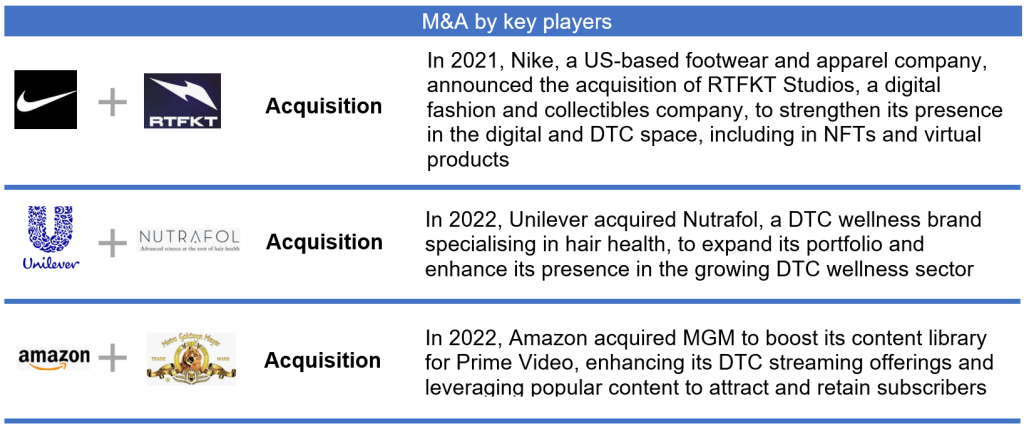
Conclusion
The DTC model continues to evolve to expand the customer experience and enhance operational efficiency through data, direct customer relationships and the integration of emerging technologies. As the model matures, it will undoubtedly continue to challenge traditional retail paradigms, offering consumers more personalised, convenient and engaging shopping experiences.
Key takeaways
-
DTC channels are fuelling the next phase of growth for several consumer and retail businesses
-
Achieving success in DTC requires a well-rounded strategy that scales up effectively and meets customer expectations
-
Companies are pursuing inorganic activities to scale up and expand their DTC operations
How Acuity Knowledge Partners can help
We support B2B and B2C companies in making decisions by providing research and insight support on the consumer sector. Equipped with a 360-degree view, we understand how customer data can be captured and analysed and how the results can be leveraged to deliver a seamless consumer experience and achieve better business outcomes. Our assistance extends to Fortune 500 technology corporations, mid-tier companies and startups, enabling them to leverage products and processes to stay flexible and better serve their customers.
Sources:
-
https://assets.kpmg.com/content/dam/kpmg/xx/pdf/2022/10/direct-to-consumer.pdf
-
https://www.gfk.com/blog/the-evolving-direct-to-consumer-dtc-journey-2024
-
https://about.nike.com/en/newsroom/releases/nike-acquires-rtfkt
-
https://www.unilever.com/investors/news-and-announcements/acquisitions-disposals/
Tags:
What's your view?
About the Author
Deepali Awasthi is a Delivery Lead in Acuity Knowledge Partners supporting consulting & corporate clients, across sectors. She has more than 8 years of experience in strategy and management consulting including end-to-end project management, market estimation, market drivers, trends, and opportunities, competitive landscape, M&A screening, industry, and company analysis, go to market strategy and others.
She worked with the private equity/corporate consulting team for various clients, where she is responsible for understanding the client’s requirements, creating the scope of work, managing a team, and delivering quality output to the client.
She has also experience in creating questionnaire and surveys to understand consumer preferences, markets, and industries.
She holds a..Show More
Like the way we think?
Next time we post something new, we'll send it to your inbox







